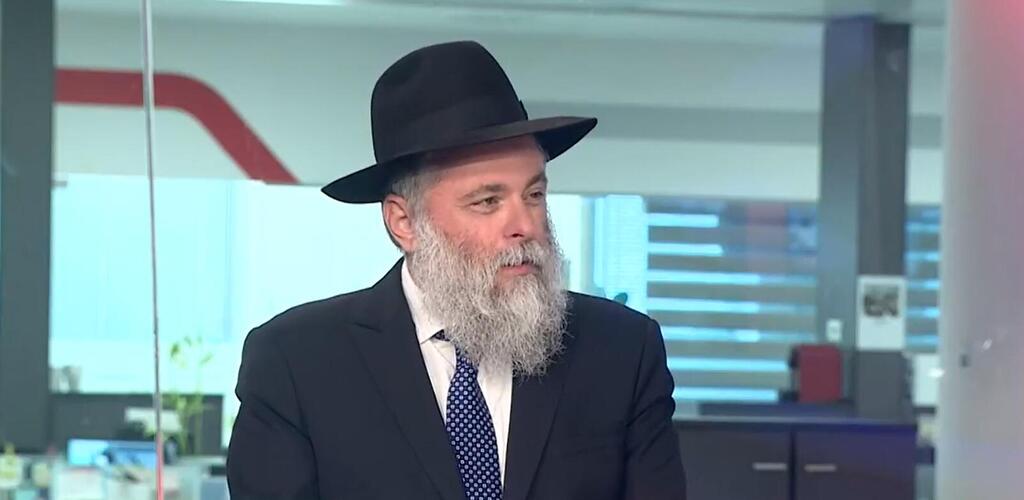Tens of thousands of Ukrainian Jews will welcome the Jewish New Year — Rosh Hashanah — under fire on Sunday evening as the end of the bloody war with Russia seems to be nowhere in sight.
Explosions echoing in the distance and blaring air raid sirens have become routine background noises for the Eastern European nation’s people in recent months and now they pray that the sound of the shofar that will be heard on Rosh Hashanah will herald a change to the soundtrack of their lives with sweet music of tranquility, peace and security.
5 View gallery
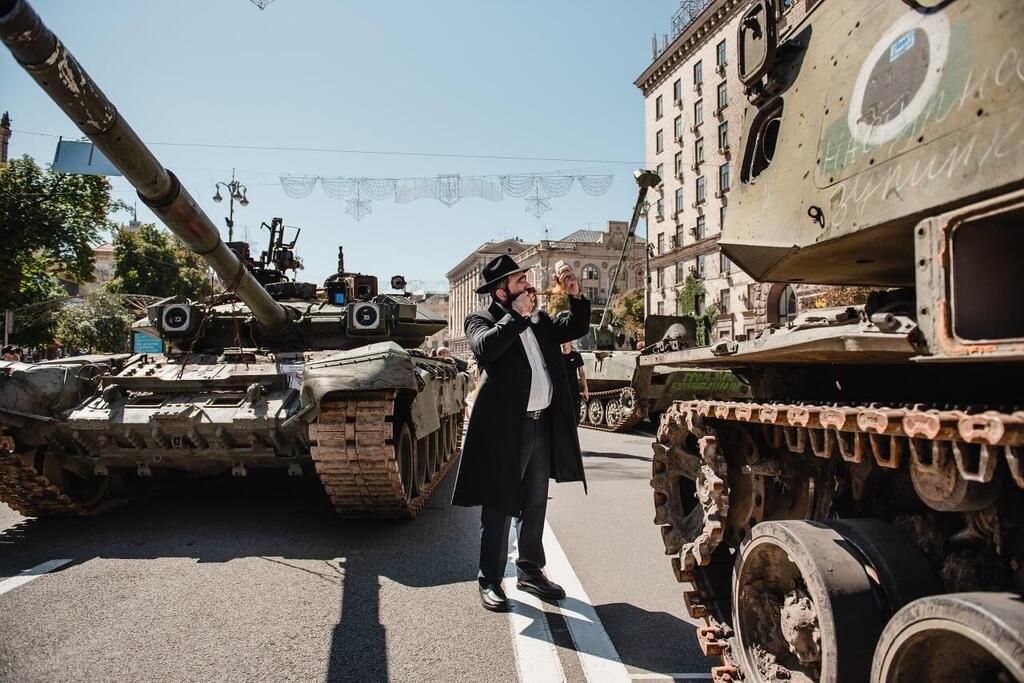

Chabad emissaries blow the shofar near Ukrainian tanks in the combat zones
(Photo: Svitlana Soroka, JRNU)
Local rabbis and Chabad emissaries handed out tons of food packages and other forms of aid to members of Jewish communities throughout Ukrainian cities.
Rabbi Shlomo Peles, who oversees the emergency distribution apparatus, estimates that thousands of Jews will flock to synagogues throughout the country during the holiday despite the situation and pray for a safer new year.
Rabbi Yehoshua Vishedsky, a Chabad emissary in the capital Kyiv, will blow a shofar for Ukrainian army soldiers.
In Zaporizhzhia — home to Europe’s largest nuclear power plant which has caused concerns amid fierce fighting around the facility — the city’s Jews are also preparing to welcome the holiday on a war footing.
“We hear terrible explosions nonstop," Rabbi Nachum Ehrentreu, the city’s chief rabbi and local Chabad emissary, tells Ynet.
"Even at night, even in the morning, my entire house was shaking. Before the war, we were in contact with thousands of Jews. Now I estimate that only 1,500 of them remain. While women, children and seniors all left at the outset of the war, most Jewish men under 60 remained in the city.”
Rabbi Ehrentreu says that these hard times push many local Jews to find and reconnect with their roots.
“This is a great awakening, the kind of which I don’t remember. People are looking to hold on to something spiritual during this time, and everyone is awakening in their own way. We try to serve as an address of encouragement and reinforcement for everyone who turns to us,” he says.
A sweet treat in bitter times
Despite constant shelling, Rabbi Ehrentreu in recent weeks koshered a local pastry factory that adheres to the strictest of Jewish dietary laws.
Thousands of pastries produced at a factory, in Zaporizhzhia, Ukraine
(Video: jrnu.org)
"The factory managers agreed to let us kosher the place, and this is trivial at all," he said. "It required shutting down the plant for many hours."
About 15,000 pastries have already been produced in the Ukrainian factory, some will be distributed to Jewish communities across the country of the country, while others will be exported to other regions.
Besides the pastries, Rabbi Ehrentreu, his wife and their four children distribute special food packages for the holiday to all the Jews of the community, along with luxury boxes containing unique gifts for the holiday that were organized ahead of time by Ukraine's Chabad.
"When the Jews of the community saw that the boxes contained not just kosher products, but also products from the Land of Israel, it gave them a very special feeling. It connects them and links them to the meaning of the holiday and to us being one united nation," the emissary describes excitedly.
"Despite the great strife, the community's Jews arrived to the distribution at the large synagogue we built in the center of the city. Everyone is getting used to this sad reality."
Rabbi Ehrentreu estimates that about 600 Jews will turn up to this year's Rosh Hashanah prayers.
"Over the past few weeks, we have encouraged the Jews in our city to come to prayers and to be partners in the community's activities during the month of the High Holidays," he says.
"Besides the mass inspection of the mezuzos and tefillin that we held, we strengthened the bonds with all the Jews of the community who experienced the war up close. There were explosions here recently that shook the entire house, but we are believers and with The Lord's help we will have a good and sweet year, without any wars."
'The neighbors' home is in ruins'
Meanwhile, the local Jewish community in the capital of Kyiv tries to go back to normal without much success after braving a major Russian onslaught, according to the city's chief rabbi Jonathan Markovitch.
More than 1,300 bodies have already been retrieved from cities liberated by Ukrainian troops in the Kyiv region alone.
The Federation of Jewish Communities of Ukraine (FJCU), a group linked to the Chabad-Lubavitch movement that is Ukraine’s largest Jewish umbrella network, says that there are almost certainly several Jews among the dead civilians, but they still cannot confirm it.
Still, the community is preparing to make this holiday a happy one as much as possible, with a record number of "shalach manos", as the rabbi prefers to call the aid boxes that will be sent to about 5,000 needy families in Kyiv alone.
"We are preparing for Rosh Hashanah on an unprecedented scale, as far as we are concerned," he tells Ynet in an interview.
"We will hold very lavish holiday feasts, and we will invite Jews to come celebrate the holidays with us at several locations. There will be a holiday spirit. Yes, even to the thousands of families who have to receive food deliveries. We at least try very, very hard."
Meanwhile, hassling around with grandmotherly anxiety, Zhanetta Butenko apologized for the mess in her home — a rocket strike had partially destroyed it in early March.
5 View gallery
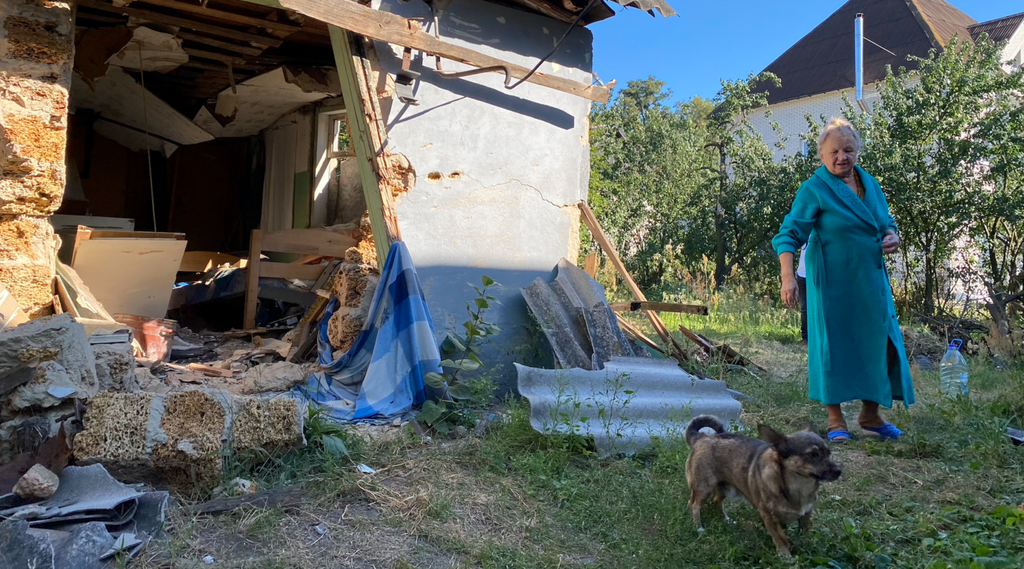

Zhanetta Butenko's house was partially destroyed when a rocket crashed through its roof in early March, in Hostemel, Ukraine
(Photo: Jacob Judah)
“What on earth will you think of your host,” she said as she walked past walls pockmarked by machine gun fire. She picked up a mangled picture frame in what was once her bedroom.
“They were firing over the house, through the windows, they destroyed everything,” she said with a sigh, “but that’s life.” Her neighbors’ homes were flattened, and a burned-out car sits down the road.
Hours after Ukraine was peppered with missile strikes in the opening salvo of the Russian invasion Feb. 24, Russian paratroopers made a brazen attempt to capture a nearby airfield in the western Kyiv suburb of Hostomel. The Russians were initially beaten back but they occupied the town in early March.
Butenko is one of the 100 or so Jews that lived in Hostomel and the nearby towns of Irpin and Bucha, both of which were the sites of bitter fighting as Russian troops tried to punch their way down from Belarus towards the Ukrainian capital.
“There were so many explosions, I can’t even begin to describe it,” said Butenko, who is 83.
Along the nearby main road towards Kyiv, which had been the target of the initial overly-ambitious Russian plan, a destroyed Ukrainian tank with its turret popped off peeked out of an alleyway, symbolizing the ferocity of the fighting that raged around Butenko’s one-story home.
“I am already worried just thinking about it,” she said, touching her hand to her cheek.
The FJCU has been supporting Jews around Kyiv through monthly deliveries of food and supplies since the Russians completed a humiliating withdrawal from northern Ukraine in April.
As Butenko spoke, two men from the Federation of Jewish Communities carried four large boxes of supplies into her living room. Each box contained supplies worth up to $150 and the set of four can keep a small family going for up to a month. The federation says it is supporting some 37,000 Jewish households across Ukraine with such packages, at a cost of some $3 million a month.
The Federation, with its network of mainly Chabad rabbis across Ukraine, has played an important role in supporting Jewish Ukrainians across the country since the war started. It has also helped by organizing buses to evacuate Jews abroad and by facilitating temporary shelter for refugees in safe areas of Ukraine.
As the winter approaches, many Jewish households — especially the mainly elderly Jews supported by the Federation — are becoming increasingly nervous about how to cover basic costs as prices and energy prices rise across Ukraine. Butenko still lacks heating and busies herself by collecting documents that would allow her to claim support from the Ukrainian government before the frost arrives.
The initial rush of private donations has also begun to wane, and the Federation is becoming increasingly concerned about its long-term financial needs.
“The shortfall is already about $20 million that we are missing,” said Rabbi Meir Stambler, who heads the group, which is being supported by the European Union and the American UJA organization.
When the Ukrainians liberated Hostomel and the neighboring towns of Bucha and Irpin, they found bodies littering the streets, buildings, and basements. Many carried signs of execution or of having been killed indiscriminately.
In Bucha, a town where the scale of the killings has etched its name forever into the narratives of the war, Sergei Soloviev clutched his kippah as he remembered the weeks that the town spent under Russian occupation.
He pointed at a group of houses obliterated by a missile strike that blew out his door and windows. Then he gestured off down the road. “Three houses down, one of my neighbors ran out into the street, and the Russians shot his head off.”
The body lay in the middle of the street, a quiet middle-class drag, for days until the man’s family was able to retrieve his body and bury him in the front yard. Sergei, 48, shuffled uncomfortably. “Dogs came,” he recalled.
These stories are not uncommon, but the fact that even the tiny Jewish population has its horror stories is an indication of how widespread the crimes that took place in the dozens of towns and villages in northern Ukraine were early on in the war.
Over 1,300 bodies have already been recovered from the towns liberated by Ukrainian soldiers in the Kyiv region alone. Figures within the Federation of Jewish Communities said that it is almost certain that Jews were among the civilians killed, but that they have not yet done a full accounting.
“It’s war,” said Rabbi Raphael Rotman, a British-born rabbi who has been in Ukraine since the 1990s, with a shrug. “It is not something far away, it is real, it is people that we have worked with.”
5 View gallery
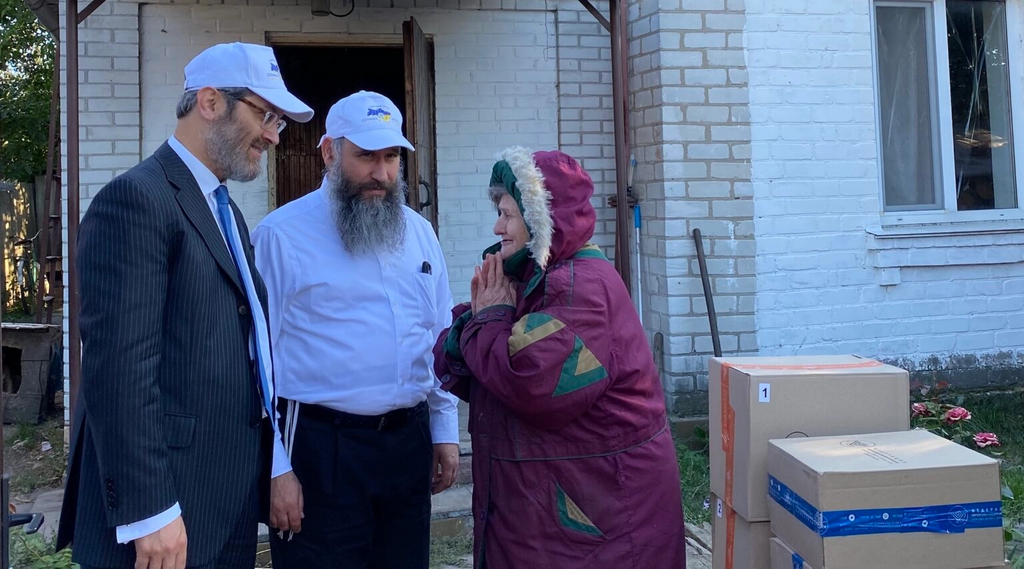

Rabbis Raphael Rotman, left, and Meir Stambler, both from the Federation of Jewish Communities of Ukraine, deliver boxes to an elderly non-Jewish Ukrainian woman in Bucha who has been receiving their aid for months
(Photo: Jacob Judah)
Struggling to heave herself up from her sofa, Sveta Azarkh, 85, wiped away tears as she described how helicopters were shot out the sky above the home where she lived with her sickly husband Yuri.
“When the Russians started going house to house, they were so aggressive,” she recalled. When her son opened the gate to a squad that had come to search their home, “they put a machine gun to his back and marched him back inside. They forced him to strip down completely to check for tattoos and bruises from wearing armor.”
As the fighting in Kyiv began to drag on longer than the Russians had expected and Ukrainian resistance picked up steam, Russian soldiers became increasingly paranoid that local civilians were sharing their locations with the Ukrainian military.
“They looked through every door, every cupboard,” Sveta explains. Other households in Bucha and Irpin said that Russian soldiers had searched their homes looking for mobile phones, weapons and anything that might associate residents with Ukrainian security forces. At Azarkh’s, the Russians stole anything that looked valuable, like watches.
As Ukrainian and Russian artillery exchanged fire over their heads, Azarkh’s elderly husband began to die. “Yuri turned to me and told me that he was dying,” she said. “I begged him: ‘Don’t die, Yura.’ I told him that I would have to bury him in the driveway.”
Yuri was buried in a patch of earth beneath a fruit tree in Azarkh’s front garden, until the Russians withdrew, when he was reburied in the local cemetery.
Two men from the Federation of Jewish Communities carried another set of four large boxes of supplies into Azarkh’s home. When the Federation dispatches its white van filled with food packages across Ukraine, wherever it goes, its volunteers and workers ask whether people know friends or neighbors — both Jewish and non-Jewish — that need help.
When asked at her home in Irpin, Evgenia Yakolevna, sprightly at 84, began making frantic phone calls to neighbors. “Are you home?” she shouted on the phone. “The Jewish community has arrived. We’re coming over.”
5 View gallery
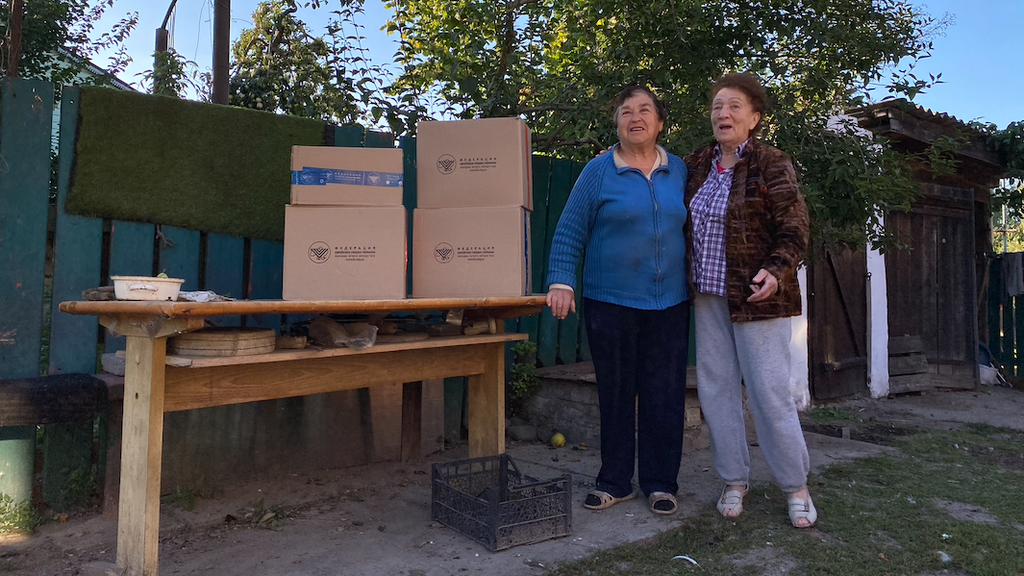

Evgenia Yakolevna, right, with her long-time non-Jewish friend, Masha. They each receive aid from the Federation of Jewish Communities of Ukraine at Yakolevna’s request
(Photo: Jacob Judah)
As she waited for answers to her phone calls, one of the Federation’s rabbis pointed to a Torah sitting on her side table with an appreciative nod. “I read it whenever I get the chance,” she said, smiling.
Yakolevna marched up and down the concrete staircases of her Soviet-era apartment complex with great confidence, knocking on doors and ordering the Ukrainian van driver to bring more boxes from the truck downstairs. The building is home to families who have fallen on hard times and elderly couples whose pensions have shrunk in value as the wartime crisis bites.
In one dimly lit apartment, a sickly elderly woman who can barely move croaks and began to cry in her bed when Yakolevna proudly declared that the “Jews have arrived.” The bedridden woman’s husband stood cautiously in a corridor. “Thanks, lads,” he said, trying to turn down the music from a Ukrainian police drama.
“We always ask if people have neighbors or friends who need support,” Rotman said. “This is an investment to help protect our Jewish brothers and sisters, because whoever their friends or neighbors are, they will be the first ones to help them when they are sick or in need of protection.”
Later, Yakolevna hitched a ride to the house of a friend, who emerges using the remains of a Russian rocket that crashed through her home as a walking stick. She had spent two months running down to her tiny cellar to shelter from bombings. More boxes are ferried from the waiting van into the yard.
“If this helps her feel better and gives her more protection when she lives as the only Jew in the block, or in the local area,” Rotman said, “then we are happy.”




